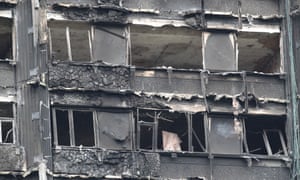
It remains hard to grasp the enormity of the Grenfell Tower fire. There is the catastrophe itself: Grenfell, quite simply, is the deadliest fire to have raged on our soil in over a century. Even the blitz didn’t start a single fire as hard to escape from as that which began in a single flat in North Kensington on 14 June 2017.
One night in December 1940, more than 1,500 fires were started after one part of London was subjected to bombing, with around 24,000 high explosive bombs and 100,000 incendiary bombs. Of course people lost their lives. More than 160 civilians died on the night, and many more afterwards, of their injuries. Yet even a grotesquely intense arson attack from a ruthless enemy claimed nothing like the sheer density of perished souls that Grenfell took.
that, you have to go back to 1887, when 186 died in a fire caused by gas lighting at the Theatre Royal, Exeter. In our modern, sophisticated, information-rich world, however, it will be a long time before all the dead are accounted for, if they ever are.
But the true enormity is that of the complacent indifference that rampaged for decades prior to this inferno. These layers of apathy and casual disregard, building inexorably towards inevitable horror, are what makes Grenfell not a disaster or a tragedy, but an atrocity.
Nor is this a matter of blindness to the safety and security of fellow humans within the confines of one rogue borough council or its leader. It is clear that in tower blocks all over England, safety tests could have been applied, and should have been applied, and that the buildings are now failing those tests.
How many people are living their lives in places that are needlessly, mortally dangerous, because small fires could so quickly turn into vast conflagrations, from which there is little means of escape? The enormity of the stress and anxiety of simply living in a refurbished tower block in England today can hardly be imagined.
And the most abject thing of all is that these blocks weren’t built that way. They were made that way by refurbishments that had entirely lost sight of what the first priority of a structure should be: the safety and security of the people within. The saddest thing is that it’s so painfully easy to see how such a dereliction should have come about, because so very many contemporary beliefs and postures have for a long time been pointing in that direction.
First and foremost, there is the widespread contempt for “health and safety”, with those charged with ensuring it regarded as tiresome and petty-minded jobsworths, useful only as the butt of jokes. Health and safety is for losers.
Next, of course, there’s the characterisation of “regulation” as a form of incarceration, limiting personal freedom as effectively as the most sinister and cruel dictatorship. Regulation from the EU is seen as particularly alien, even though we are members of the union, so any EU regulation is in fact self-regulation.
Regarding Grenfell in particular, Kensington and Chelsea borough council, having failed to self-regulate first by keeping its constituents safe, then by failing to support survivors in extremity, defiantly insists it must continue to be allowed to self-regulate. The council meeting cancelled on Thursday because the media won the legal right to attend is a perfect example of such refusal of accountability.
Yet when a society is hostile to self-regulation, it is basically hostile to being a society. And, indeed, a hostility to the idea that society even exists has been a longstanding feature of British political life. Disregard for the concerns of the people living in Grenfell – a disregard strong enough for their action group’s voiced concerns to be characterised as “harassment” – surely suggests that Grenfell’s residents were not viewed as people with a right to be heard but as pathetic supplicants, ungrateful for what had been bestowed upon them.
Of course, the idea that people who need social support are, by definition, moral failures, has been currency for quite some while. Shame is one of the most corrosive of human feelings, yet it has been a matter of policy for years that reliance on “state handouts” should be a cause for shame.
Shame is often deeply debilitating. It’s the last thing that vulnerable people need more of. Yet those who reject shame – such as the members of the Grenfell Action Group – are viewed as troublemakers and militants, rather than people who have a great deal more to offer than their long-denigrated circumstances might suggest. Except they can’t possibly have things to offer, because they’re poor.













No comments:
Post a Comment